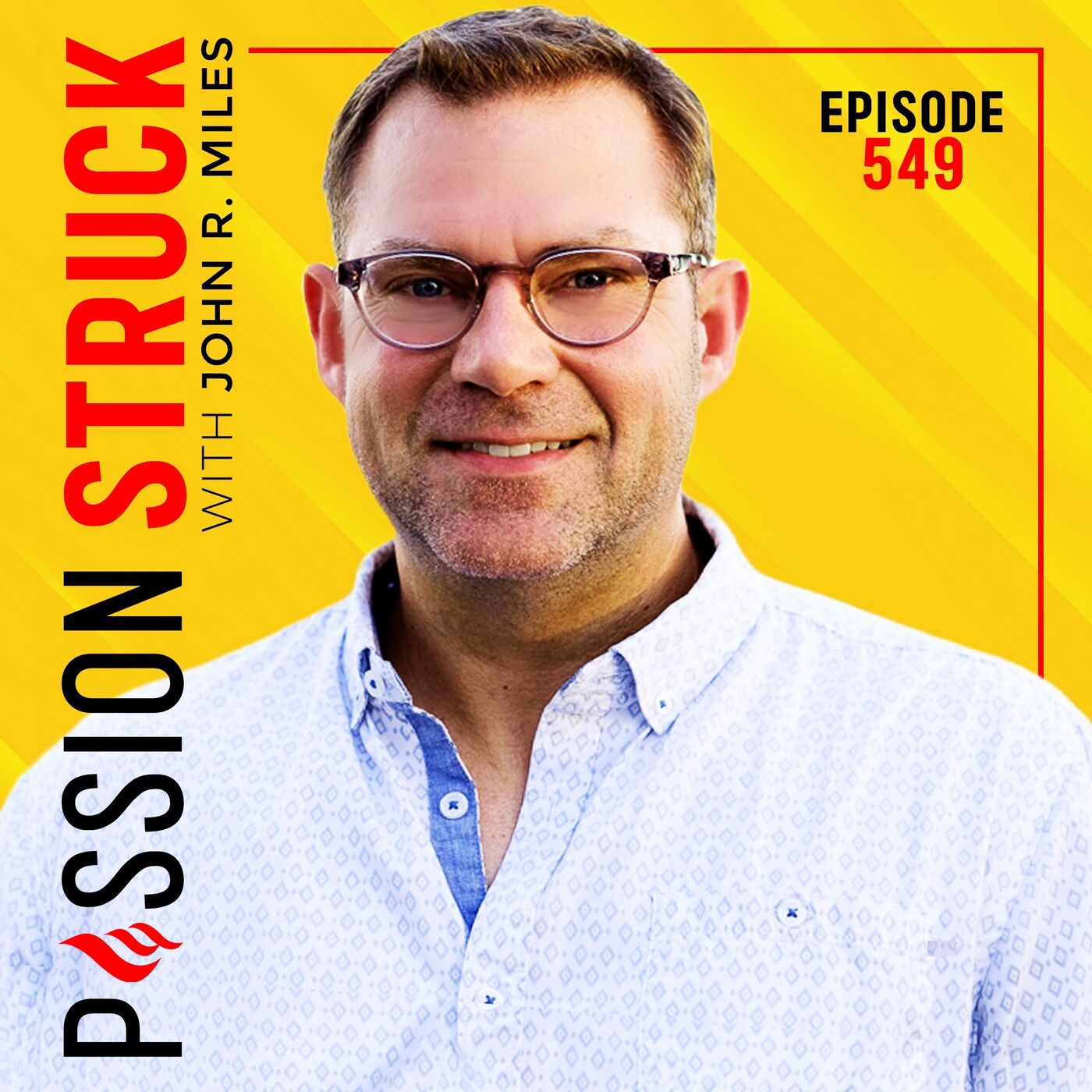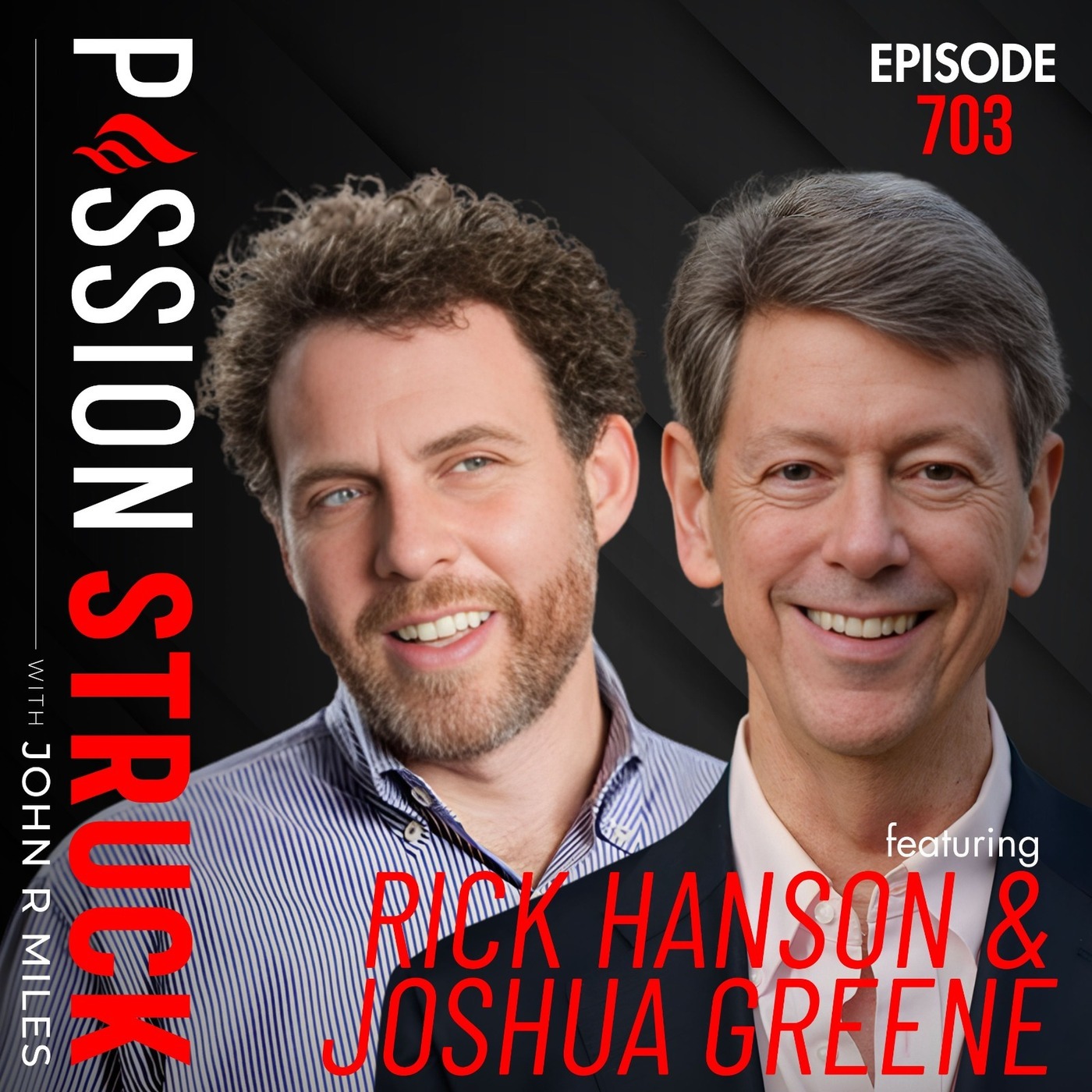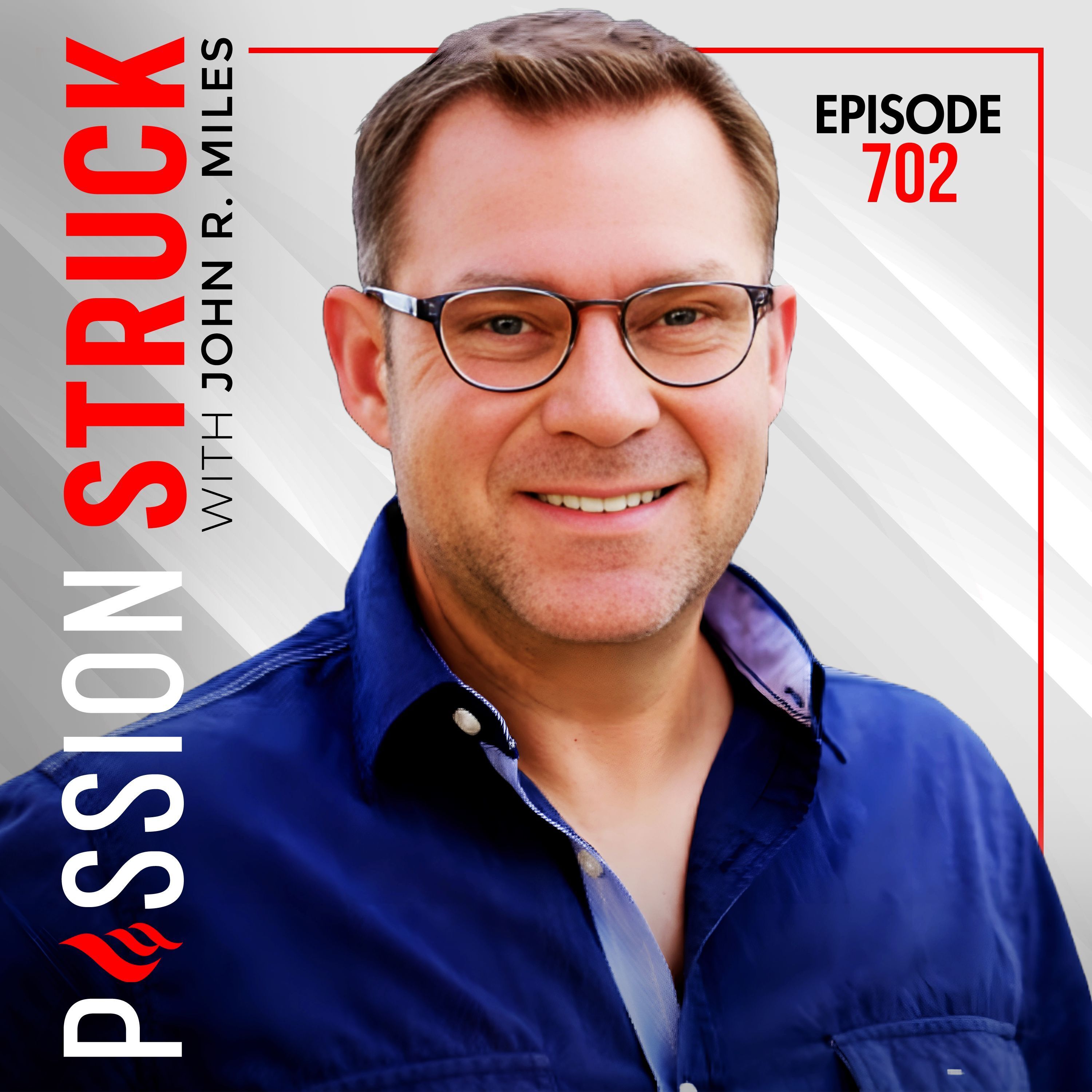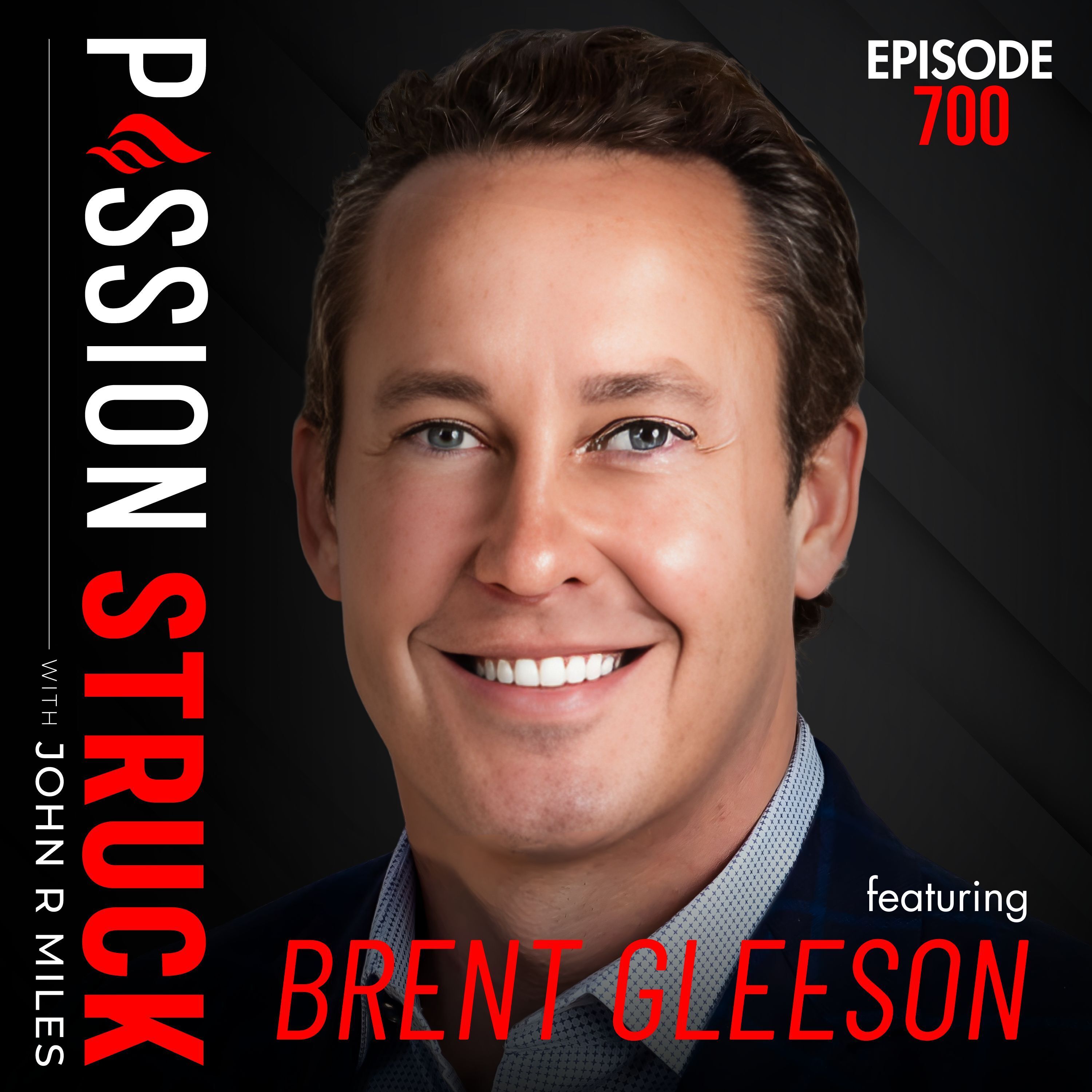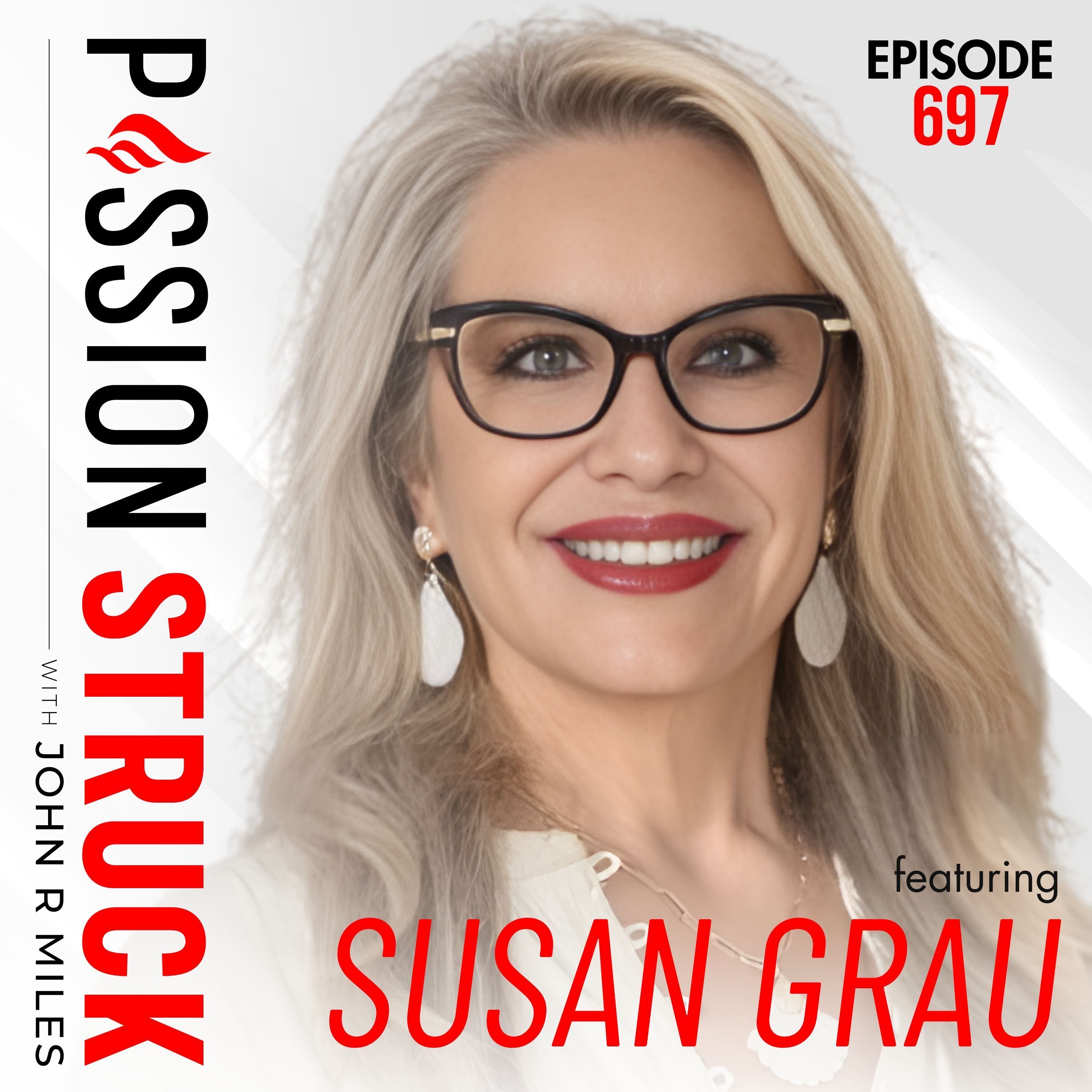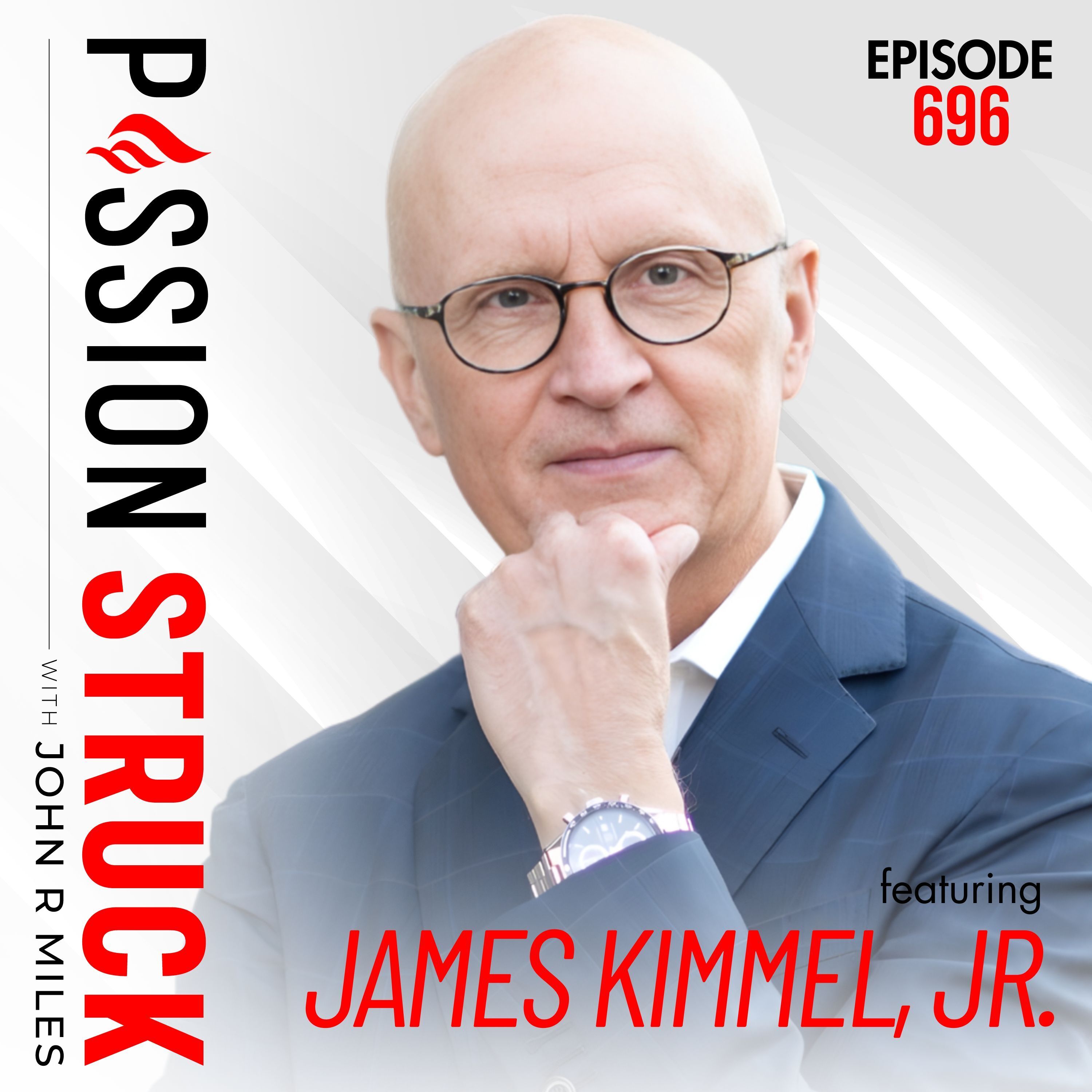Unlocking the Richard Branson Formula: Why Happiness Leads to Success | EP 549
Press play and read along
Transcript
Speaker 1 up next on Passion Struck. What if everything you thought about success was backwards?
Speaker 1 What if the secret to achieving more isn't grinding harder or playing it safe, but something far simpler and often overlooked?
Speaker 1 In this episode, I'll explore a mindset that has propelled some of the world's most daring and accomplished people to extraordinary heights. It's not about luck or genius.
Speaker 1 It's about how you show up every day and how you approach life's challenges. Stick around because by the end, you just might rethink the way you define success.
Speaker 2 Welcome to Passion Struck. Hi, I'm your host, John R.
Speaker 2 Miles, and on the show, we decipher the secrets, tips, and guidance of the world's most inspiring people and turn their wisdom into practical advice for you and those around you.
Speaker 2 Our mission is to help you unlock the power of intentionality so that you can become the best version of yourself. If you're new to the show, I offer advice and answer listener questions on Fridays.
Speaker 1 We have long-form interviews the rest of the week with guests ranging from astronauts to authors, CEOs, creators, innovators, scientists, military leaders, visionaries, and athletes.
Speaker 1 Now, let's go out there and become passion struck. Welcome back, everyone, to another Momentum Friday in episode 549.
Speaker 2 I'm thrilled to have you here.
Speaker 2 Whether you're a longtime listener or brand new to the show, this is where we challenge conventional thinking and explore what it means to live with intention, purpose, and impact.
Speaker 2 And today's episode dives into one of the most inspiring examples of all, the legendary Richard Branson. But before we dive in, let's talk about this week's incredible episodes.
Speaker 2 On Tuesday, I sat down with Miss America Madison Marsh, an Air Force pilot, humanitarian, and an exceptional example of what it looks like to chase audacious dreams with discipline and grace.
Speaker 2 We talked about breaking barriers, setting bold goals, and the mindset it takes to pursue them.
Speaker 2 Then, on Thursday, I had a fascinating conversation with Caroline Adams Miller, a leading expert on grit and goal setting.
Speaker 2 Caroline shared practical insights about how to set the kind of goals that stretch you, challenge you, and ultimately help you achieve lasting success.
Speaker 1 If you've ever wondered how to move from setting goals to actually achieving them, that episode is one you'll want to bookmark.
Speaker 1 If you've missed either of those episodes, I highly recommend you go back and give them a listen. They're filled with insights that perfectly complement what we're talking about today.
Speaker 1 For anyone new to the show, I've got a shortcut for you. With over 540 episodes, it's easy to get overwhelmed.
Speaker 1 That's why we've created curated starter packs organized around themes like leadership, grit, and personal growth.
Speaker 2 Head over to passionstruck.com slash starter packs or find them on Spotify to dive right into topics that matter most to you.
Speaker 2 And if you're ready to take these ideas even further, sign up for my Live Intentionally newsletter at passionstruck.com.
Speaker 1 Each week, I'll send you practical strategies and insights to help you thrive with purpose and intention.
Speaker 2 And for those who prefer visuals, don't forget to check out the YouTube channel for highlights, episodes, and tools that make your growth journey even more engaging.
Speaker 2 Now let's talk about today's episode. If you've ever sat around wondering what it takes to be successful, you've probably thought about the usual suspects.
Speaker 2
Hard work, intelligence, strategy, maybe even luck. And sure, those things matter.
But there's a sneaky little factor that often gets left out of the equation. Happiness.
Speaker 1 Yeah, I know.
Speaker 2 The self-help world has shoved just be happy down our throats so much that it's tempting to roll your eyes.
Speaker 1
But hang tight because it's possible we've been flipping the script all wrong. Success doesn't create happiness.
Happiness fuels success. Sounds a bit backwards, right?
Speaker 1 We've been conditioned to think that life works like this. Hustle like your hair is on fire.
Speaker 2
Achieve big, important goals. Voila! Happiness will reward you like some celestial participation trophy.
But science and experience suggests otherwise.
Speaker 2 Some of the most accomplished people don't see happiness as a reward. They see it as a prerequisite, a driver, an edge.
Speaker 1 Take Richard Branson for example.
Speaker 2
The guy practically turns work into a playground. Founding the Virgin Group was never just about building a business empire.
It was about living life fully, joyfully, and sometimes ridiculously.
Speaker 2 Branson launched Virgin Atlantic not just to disrupt airlines, but because it excited him.
Speaker 2 He attempted to break records in speedboats and hot air balloons, not to prove anything, but because, well, why the hell not?
Speaker 2 Life for Branson isn't just a series of achievements, it's a series of adventures. And here's the kicker.
Speaker 1 Even when he failed, and he failed a lot, crash landings, business losses, mechanical disasters, he maintained a radical sense of optimism. He chose to laugh when he could have quit.
Speaker 1
He chose to enjoy the chaos. And that joy, that relentless enthusiasm, became his competitive advantage.
So instead of asking, how do I become successful so I can be happy?
Speaker 1 Maybe the better question is this. How do I stay happy so I can become successful?
Speaker 2 Counterintuitive, sure, but also incredibly powerful. In this episode, we're going to unpack the science of why happiness isn't just good for you, it's good for business, achievement, and resilience.
Speaker 2 How Branson's joyful outlook became a cornerstone of his success.
Speaker 2 Practical ways you can engineer happiness into your life because it's not all sunshine and hot air balloons, and joy doesn't happen by accident.
Speaker 2 But before we dive in, let's clarify something important. What the heck do we we actually mean when we say happiness? Is it bliss? Satisfaction? Purpose? Let's start there.
Speaker 2 Thank you for choosing Passion Struck and choosing me to be your host and guide on your journey to creating an intentional life.
Speaker 1 Now, let that journey begin.
Speaker 1 Before we start thinking about happiness as some magic fuel for success, we need to get clear on what it actually is.
Speaker 1
But let's face it, happiness is one of those words that gets thrown around like confetti at a wedding. Nice to look at, but kind of a mess when you try to clean it up.
So let's get this straight.
Speaker 1
Happiness isn't just about feeling good all the time. It's not sipping margaritas on a beach while your problems politely disappear.
That's not happiness.
Speaker 1
That's a vacation and a temporary one at that. Real happiness is more like a combination of three things.
First, pleasure, those bursts of joy that make life fun.
Speaker 1 A great meal, a solid laugh, a killer concert, which I love. These moments are important but fleeting.
Speaker 1 Then there's engagement, the state of being so absorbed in something that you forget what time it is. You're focused, you're in flow, you're alive.
Speaker 1 Whether you're writing, playing basketball, or geeking out on a project, this is where you feel connected to what you're doing. And then there's meaning, the big one.
Speaker 1 It's the sense that your life, your work, and your time matter.
Speaker 1 It's about contributing to something larger than yourself, whether it's your family, a cause, or your own personal vision of what success looks like.
Speaker 1 When psychologists talk about happiness, they're not talking about one fleeting emotion. They're talking about these three layers working together like gears in a well-oiled machine.
Speaker 1
When you have pleasure, engagement, and meaning, you've got the kind of happiness that doesn't just feel good. It fuels you.
It keeps you going when things get tough. Now here's the twist.
Speaker 1
This kind of happiness isn't just a nice to have. It's a performance enhancer.
Sean Aker calls this the happiness advantage. Studies show that happier people aren't just more fun to be around.
Speaker 1
They're more productive, creative, and resilient. Their brains perform better.
Their relationships are stronger. They handle stress like pros.
In short, happiness makes you better at everything.
Speaker 1
Think about it this way. When you're happy, when you're engaged, when you're connected, when you're excited about life, you show up differently.
You make better decisions. You take smarter risks.
Speaker 1
You bounce back faster from failure. And that's exactly what you need to succeed.
So the next time you're tempted to put off happiness until after you've hit some arbitrary goal, remember this.
Speaker 1 Happiness isn't the finish line, it's the fuel. The challenge, of course, is figuring out how to create this kind of happiness in your own life.
Speaker 1 Because let's be honest, it's not always easy to choose joy when your boss is a jerk, your deadlines are breathing down your neck, and you're two days deep into existential dread.
Speaker 1 So how do you make it real? How do you build happiness that lasts? Not the fleeting, surface-level kind, but the deep, sustainable kind that actually drives you forward.
Speaker 1 The answer isn't about ignoring the tough stuff. It's about building habits that prioritize joy, curiosity, and purpose.
Speaker 1 The same tools that have shaped some of the world's most resilient and accomplished people. If there's one person who embodies this mindset, it's Richard Branson.
Speaker 1 If his life teaches us anything, it's that joy, curiosity, and purpose aren't fluffy concepts. They're the foundations of a life worth living.
Speaker 1 They're not something you wait for, they're something you cultivate. And Branson started building them early, shaped by experiences that most of us would call unconventional, even extreme.
Speaker 1 Richard Branson didn't stumble into resilience and optimism by accident. His story starts in the English countryside where his childhood was a crash course in mindset.
Speaker 1
His mother, Eve, was relentless in teaching him independence and resilience, sometimes through eyebrow-raising methods. Take this story.
One day, she drove him miles away from home.
Speaker 1
and told him to find his way back. Not exactly helicopter parenting, but Branson's mother understood something critical.
Confidence comes from struggle.
Speaker 1 Branson wasn't born with a silver spoon or a golden ticket. He was born with dyslexia, a challenge that made words and numbers feel like enemies.
Speaker 1
School became an uphill battle, and in any other household, he might have been labeled as a failure. Instead, his parents flipped the script.
They focused on what he could do, not what he couldn't.
Speaker 1
That mindset, shifting attention from limitations to opportunities, became a cornerstone of his life. Branson threw himself into sports with an infectious enthusiasm.
He didn't just play, he excelled.
Speaker 1
Rugby, football, cricket. He captained all the teams.
Then came the long jump. He'd never attempted it before, but on a whim, at age 10, he gave it a shot.
Speaker 1
Not only did he succeed, but he broke the school record. This wasn't about the record itself.
It was about something bigger. The joy of trying.
The thrill.
Speaker 1
of discovering what's possible when you lean in. Give it a go and stop worrying about failure.
Branson's success in in sports wasn't just about competition. It was about curiosity.
Speaker 1 He approached new challenges with a simple question, why not? Where others might hesitate, afraid of looking foolish or failing, Branson leaned in. That curiosity didn't stop on the field.
Speaker 1 It carried over into the rest of his life. School didn't work for him, but that didn't stop him from looking for other ways to thrive.
Speaker 1
Branson developed an insatiable interest in the world outside the classroom. People, problems, possibilities.
As he grew older, that sense of curiosity led to his first entrepreneurial ventures.
Speaker 1 While his dyslexia made reading and organizing difficult, it also sharpened his ability to think differently. He had no interest in playing by the rules of the system.
Speaker 1 He wanted to find ways to work around them, and this started a pattern. He started seeing a problem where others saw no opportunity.
Speaker 1 He began asking, why not me, when others didn't dare, and he started taking action even when the outcome was uncertain. Curiosity gave him an edge.
Speaker 1
It freed him from the trap of perfectionism and let him explore without the weight of expectation. Branson's early life was not a fairy tale.
The world didn't hand him success.
Speaker 1
It handed him obstacles. Dyslexia could have been a reason to quit.
Poor grades could have been proof that he wasn't smart enough.
Speaker 1
And later, his early ventures, like his first mail-order record business, were littered with setbacks. But here's the thing.
Branson never let failure define him. Why?
Speaker 1 Because he had a clear sense of purpose. Even as a teenager, he was focused on creating, building, and solving problems that mattered to him.
Speaker 1
When his record business struggled, he didn't see failure as the end. He saw it as a lesson.
Each setback fueled his next attempt. Every obstacle became a stepping stone towards something better.
Speaker 1
Branson wasn't just chasing money or status. He was chasing the process.
He believed in the work he was doing, and that belief gave him the resilience to keep going when most people would have quit.
Speaker 1 Purpose was his anchor. It allowed him to weather failures because he wasn't tied to short-term results.
Speaker 1 He was focused on the bigger picture, building something meaningful, solving problems creatively, and living life on his own terms.
Speaker 1 So this leads to the science of happiness, the key to Branson's success. Branson's story perfectly aligns with the principles outlined in Sean Akers' The Happiness Advantage.
Speaker 1 Branson exemplified how happiness, optimism, and resilience could serve as powerful tools for success, even in the face of repeated setbacks.
Speaker 1 Rather than viewing happiness as a result of his achievements, he cultivated it as a driving force.
Speaker 1 Studies like Akers Harvard Research and the work of Laura King, Sonia Lieberminski, and Ed Diener underscore the transformative power of positive emotions.
Speaker 1 Just as Branson used his joy, gratitude, and optimism to fuel his entrepreneurial spirit, these studies reveal that happiness isn't merely a byproduct of success, it's a precursor to it.
Speaker 1 Positive emotions spark creativity, resilience, and productivity, allowing individuals to thrive in the face of challenges, just as Branson did.
Speaker 1 Richard Branson's formative years were a masterclass in what it means to live fully, to find joy in what you can do, to follow your curiosity, and to stay anchored in a sense of purpose.
Speaker 1
He could have been weighed down by his dyslexia. He could have avoided risks out of fear of failure.
Instead, he leaned into the discomfort, asked, why not?
Speaker 1 when others said no, and found meaning in the process of growth. So, what does this mean for you? It means stop focusing on what you can't do, start finding joy in what you can.
Speaker 1
Letting curiosity lead you. Try things.
Explore ideas. Take chances.
Stay anchored in purpose. Find what matters to you and let that guide your actions.
Speaker 1
Branson's story isn't about perfection or innate brilliance. It's about mindset.
It's about habits. It's about choosing joy, curiosity, and purpose as a way of life.
Speaker 1 And if he could do it starting from a small English town with no special advantages, why not you?
Speaker 1 In the next section, I'll take these principles and break them down into practical, actionable habits you can start building today. Because happiness doesn't just happen, it's something you choose.
Speaker 1 So now that we've explored how Richard Branson turned joy, curiosity, and purpose into a way of life, the question becomes, how do you do the same?
Speaker 1 Because let's face it, most of us aren't being dropped miles from home as resilience training, and we don't wake up with Branson's instinct to say, why not? When everyone else is saying, why bother?
Speaker 1 The good news, you don't need extreme experiences or larger-than-life adventures to cultivate these habits.
Speaker 1 You just need to take small, deliberate steps, steps that make joy, curiosity, and purpose a regular part of your everyday life. Here's how you can start building your own playbook.
Speaker 1
First, redefine joy by focusing on what you can control. Happiness doesn't come from waiting for the stars to align.
It comes from finding joy in what's already within your grasp.
Speaker 1
Branson didn't dwell on his dyslexia or poor grades. He found joy in sports, in competition, and in every small victory he could create for himself.
So how can you do it?
Speaker 1
First, identify what energizes you. What activities make you feel alive? It doesn't have to be groundbreaking.
Maybe it's painting, cooking, or problem solving at work.
Speaker 1
Make time for those things daily, even in small doses. Second, find wins in the process.
Shift your focus from outcomes to effort.
Speaker 1 Whether you're running a business, writing a report, or learning something new, celebrate progress, not just perfection. Third, control the controllables.
Speaker 1 You can't change your boss, your deadlines, or traffic jams, but you can control your attitude, actions, and where you direct your attention. Prioritize those.
Speaker 1 The trick isn't to avoid challenges, it's to approach them with a mindset that allows you to find moments of joy, even in the chaos. So I'm going to give you an exercise.
Speaker 1 Let's call it the Daily Wins Journal.
Speaker 1 The objective here is to train your mind to notice and celebrate small victories, progress, and the things that you can control, bringing intentional joy to your day. So let's go through the steps.
Speaker 1
The first thing you're going to do is set up a journal. Create a simple log using a physical notebook or digital note with three sections.
What energized me today? What small wins did I celebrate?
Speaker 1 And what did I control or improve? Then, at the end of each day, spend five to ten minutes writing answers to each section. What energized me? List one activity that made you feel alive or engaged.
Speaker 1
For instance, cooking, solving a tough problem, or playing with your kids. Small wins.
Write down one thing you accomplished, big or small.
Speaker 1 Maybe you sent that email you've been avoiding, finished a workout, or simply stayed calm during a stressful meeting. And then lastly, what did I control?
Speaker 1
Reflect on something you handled intentionally. Your attitude, how you reacted to stress, or the time you spent on what mattered most.
At the end of the week, look back at your entries.
Speaker 1 Identify patterns. What consistently brings you joy? Where did you feel most in control? How can you prioritize these wins moving forward?
Speaker 1 By intentionally tracking joy and control, you'll reframe your focus and start noticing opportunities for happiness in your everyday life, even in the chaos.
Speaker 1 The second element in your playbook is how to feed your curiosity, turning what if into why not.
Speaker 1 Curiosity was Branson's superpower, whether it was breaking into the record industry, starting an airline, or launching a hot air balloon across the Atlantic.
Speaker 1 His success came from a willingness to ask, what if I tried this? And why not me? So how can you do it? First, you need to take one small risk.
Speaker 1
Try something new, something that makes you just a little uncomfortable. Start that project you've been overthinking.
Explore a hobby without worrying about being good at it.
Speaker 1 Next, ask better questions. When faced with a problem, replace why me with what can I learn from this? Or what's the opportunity here? And then lastly, make time for curiosity.
Speaker 1
Build space in your life to explore. Read books, listen to podcasts, or meet people outside your usual circles.
Curiosity doesn't spark itself. You need to feed it.
Speaker 1 The important thing here that I want you to remember is that curiosity doesn't require certainty. It thrives on possibilities.
Speaker 1
Lean into the unknown and you'll discover opportunities you didn't even know existed. So I'm going to give you an exercise to do.
Let's call it the curiosity experiment list.
Speaker 1 The objective here is to push yourself to make small curiosity-driven risks and explore ideas, hobbies, or challenges without overthinking outcomes. So let's go through the steps.
Speaker 1 The first one is to create your why not list. I want you to write down five to ten small things you've been curious about but haven't pursued.
Speaker 1 Examples might include trying a new hobby like painting, yoga, or coding, starting a side project or passion initiative you've been postponing, taking a class, listening to a new podcast, or reading a book on a topic that you know nothing about.
Speaker 1 It could be having a conversation with someone outside your usual circles or pitching that idea at work you've been hesitant to share. The next step is to set a a timeline.
Speaker 1
Commit to trying one to two items on your list. Keep it low pressure.
This isn't about being good. It's about being curious.
Then document the experience.
Speaker 1 After each experiment, reflect on these three prompts. What did I learn? How did it feel to try this? What new possibilities opened up? Then you rinse and repeat.
Speaker 1
Add to your list regularly and keep exploring. Let one why not inspire the next.
And here's the outcome.
Speaker 1 By taking small, curiosity-driven risks, you'll train yourself to embrace uncertainty, enjoy discovery, and unlock opportunities that you've never expected.
Speaker 1 And now let's talk about the last element of your playbook, anchoring yourself in purpose, which is knowing your why. Purpose isn't about chasing big, lofty ideas.
Speaker 2 It's about connecting what you do to what matters.
Speaker 1
Branson didn't build Virgin just to make money. He built it to solve problems, to challenge norms, and to create something exciting.
Purpose gave his risks meaning and his failures direction.
Speaker 1 So how can you do it? First, define what matters to you. Ask yourself, what kind of impact do I want to have? What values guide me? What problems excite me to solve?
Speaker 1
The important thing here to understand is that purpose doesn't have to be grand. It just has to resonate.
Second, connect your tasks to meaning. Even the mundane can have purpose.
Speaker 1
Writing a report, it's not just a task, it's an opportunity to share an idea. Helping a coworker, it's not just about work, it's about connection.
And then third, reframe failure as progress.
Speaker 1 Purpose allows you to see setbacks not as dead ends, but as lessons. Keep your eye in the bigger picture and ask, what can this teach me?
Speaker 1 Purpose is what gets you up in the morning and keeps you going when the path gets tough. It transforms challenges into stepping stones and gives every effort a reason to matter.
Speaker 1 So here's an exercise on how you can anchor yourself in purpose. We're going to call it the purpose map.
Speaker 1
The objective here is to clarify what matters most to you and connect your daily tasks to a greater sense of meaning. So let's go through the steps.
First, define your values.
Speaker 1
Write down three to five core values that guide you. Examples could be growth, creativity, family, connection, impact.
Second, identify your why. Ask yourself, what kind of impact do I want to have?
Speaker 1 What problems excite me to solve? What activities make me feel fulfilled and aligned? Write a short statement of your purpose in one to two sentences.
Speaker 1 For example, I want to create work that inspires others to think differently and take action. Then third, connect tasks to purpose.
Speaker 1 For the next week, before starting any task, pause and ask yourself, how does this align with my values? How can this contribute to my bigger why?
Speaker 1
For example, writing a report isn't just about meeting a deadline. It's about sharing ideas that add value.
Answering emails isn't just busy work. It's about building trust and connection.
Speaker 1 Fourth, reframe setbacks. When you encounter failure or frustration, write down, what's the lesson here? How did this challenge help me grow or move closer to my purpose?
Speaker 1 And then fifth, reflect weekly. At the end of the week, review your tasks and ask, did I stay aligned with my purpose? What can I adjust next week to live more intentionally?
Speaker 1 The outcome here is by identifying your why and connecting it to everyday actions, you'll transform even mundane tasks into meaningful contributions, fueling resilience, focus, and satisfaction.
Speaker 1 Each exercise is about progress, not perfection. Start small, stay consistent, and let joy, curiosity, and purpose guide your actions.
Speaker 1
Over time, these habits will rewire how you approach challenges, opportunities, and success, just like Richard Branson. Now, take one step.
Choose and exercise and start today.
Speaker 1 So wrapping up, if there's one thing Ranson's life teaches us, it's this. Success doesn't come from waiting for the perfect moment, the perfect plan, or the perfect circumstances.
Speaker 1 It comes from the mindset you choose every single day. Branson's story isn't about having all the answers or avoiding failure.
Speaker 1 It's about leaning into life with a sense of joy, following your curiosity wherever it leads, and anchoring yourself to a purpose that matters.
Speaker 1 It's about building habits that allow you to see setbacks as stepping stones, challenges as opportunities, and progress as the real victory. And the best part?
Speaker 1 You don't need to start a global empire or fly a hot air balloon across the Atlantic to follow his playbook.
Speaker 1 You just need to redefine joy by focusing on what you can control and celebrate the small wins. By feeding your curiosity, take risks, ask questions, and explore without overthinking.
Speaker 1
And anchor yourself in purpose. Find your why and let it give meaning to your daily actions.
Happiness isn't a reward waiting at the finish line. It's the fuel that gets you there.
Speaker 1
It's the thing that makes success not just possible, but worth it. So what's next? Take one step today.
Choose to see joy in the process. Ask, why not when you're tempted to play it safe?
Speaker 1 Connect your actions to something bigger than yourself.
Speaker 1 Because if Richard Branson could start from an unassuming English village armed with nothing but optimism, curiosity, and resilience, then why not you? The choice is yours.
Speaker 1 Will you lean into life fully or will you wait for happiness to just happen? As Branson's story shows us, the answer is simple. Stop waiting, start choosing.
Speaker 1
And when you do, you might just find find that success starts to follow. So go ahead, take the leap, build your playbook.
Why not start now?
Speaker 1 If today's episode resonated with you, please take a moment to leave a five-star rating and review.
Speaker 1 It's one of the simplest and most powerful ways to help others discover the show and join our mission to live with more intention, joy, and purpose.
Speaker 1 And if you know someone who needs to hear the lessons from Richard Branson's incredible journey, share this episode with them. Together, we can spread the power of connection and resilience.
Speaker 1 I'm passionate about bringing these lessons beyond the podcast.
Speaker 1 If you're looking to inspire your team, your organization, or your community through keynote speeches, workshops, or events, I'd love to partner with you.
Speaker 1 Visit johnrmiles.com slash speaking to learn more. For everything we discussed today, including links, resources, and more, head over to the show notes at passionstruck.com.
Speaker 1 And if you would like a written version of the playbook, then sign up for my newsletter and I'd be happy to send you one.
Speaker 1 Don't forget to watch the video versions of our podcast on the YouTube channel. And while you're there, hit subscribe so you'll never miss an episode or highlight.
Speaker 1 And if you want to support the show, check out our sponsors and exclusive deals at passionstrike.com slash deals.
Speaker 1
Supporting those who support us helps us keep this content coming to you every single week. Before we go, here's a quick look at next week's episode.
I'll be joined by Dr.
Speaker 1 Abraham George, founder of the George Foundation, and Shanti Bhavan, a school transforming the lives of disadvantaged children in India. Dr.
Speaker 1 George's mission to tackle poverty, inequality, and injustice is a masterclass in purpose-driven leadership and creating lasting impact. You won't want to miss this inspiring conversation.
Speaker 3
Poverty has different dimensions. It's not hunger, it's suffering, and even indignity of being in a lower caste.
That is also a part of poverty.
Speaker 3 So I find all these activities that I embarked on, they're closely interrelated, though you may not see it as such. Somebody may argue that I did, doesn't fit in with poverty is lead poisoning.
Speaker 3 That's an urban problem more more than anything else.
Speaker 3 But I would argue even there,
Speaker 3 who suffers most is the poor people in slums who have no way of protecting themselves, who are right next to a factory that is fabricating lead. They are the ones who are suffering.
Speaker 3 So it's also a poverty issue. So everything I've done has some connection, may not be directly visible, but some of them are directly connected.
Speaker 2
Thank you for choosing to spend your time with me today. Your commitment to learning, growing, and living.
A life of meaning inspires me every single day.
Speaker 2 I hope this episode has added value to your journey in reminding you that success isn't about waiting for happiness, it's about creating it. And remember, the fee for this show is simple.
Speaker 2
If you found value here, share it with someone who might benefit. Until next time, keep leaning into joy, curiosity, and purpose.
And as always, live life passion strong.
